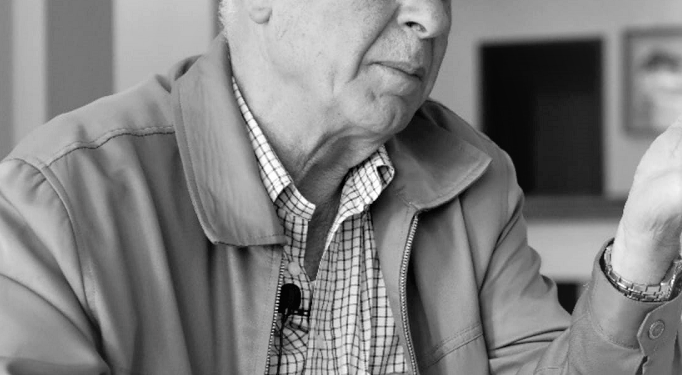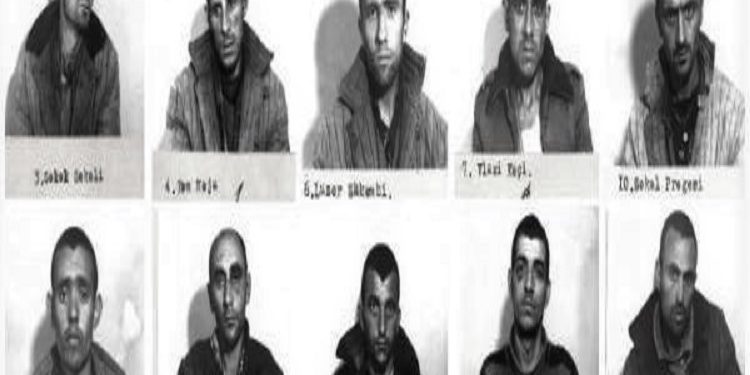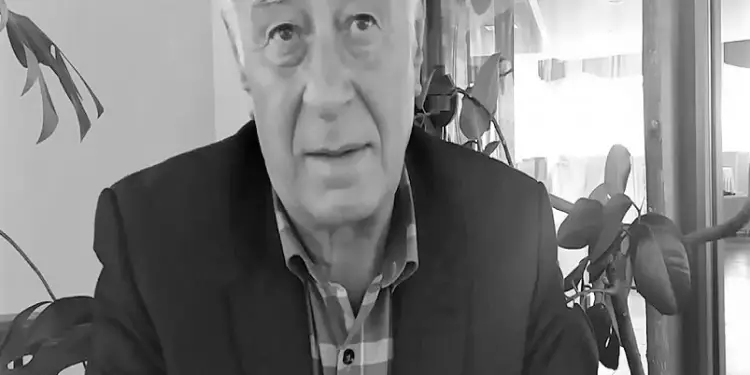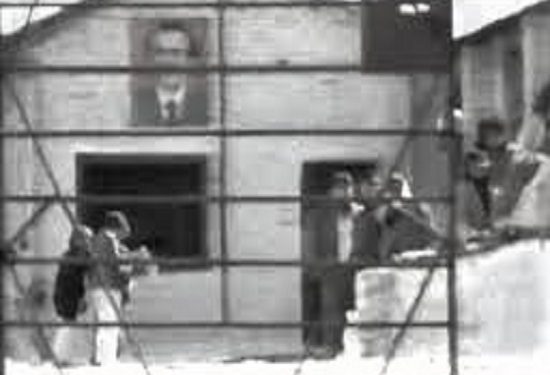By Najada Pendavinji
Memorie.al / Petrit Bazelli is one of the persecuted of the communist regime of Enver Hoxha and his successor, Ramiz Alia, who as a family experienced the persecution immediately after the end of the War in 1944. He was arrested by the State Security, under the charge of “agitation and propaganda” in March 1980. He was born in the village of Maliq in Korça, in 1949, and is the grandson of the well-known patriot, Pasho Kolaneci, (whom the communist regime shot, accusing him of being an “enemy of the people”), and the cousin of Asim Bazell, who was sentenced to 25 years in prison. Petrit Bazelli was the third from his tribe to experience the communist revenge, being sentenced to 10 years in prison, which he suffered mainly in Spaçi and Qafë Bari camps. He is one of the eyewitnesses of the revolt in the Qafë Bar prison camp, in May 1984, and in his testimony, he speaks with pain about some of the fellow sufferers who were tortured, injured or lost their lives during that revolt which was organized by them, for more freedom and human rights. Immediately after the collapse of the communist regime at the beginning of 1991, Petrit Bazelli became involved in giving his contribution to the protection of the rights and dignity of the victims of communist crimes.
Mr. Bazelli, what is your family history?
I am from Maliqi i Korça and I come from a middle-class family economically, but our forefathers have contributed to the liberation of Albania, such as the patriot Pasho Kolaneci, who was shot by the communist regime together with Asim Bazell who was sentenced to 25 years in prison.
Thus, I am the third from the tribe that suffered and experienced communist prisons. I graduated from high school with excellent results and worked as a math teacher in the village of Moglicë until 1975, when I was suddenly fired without any reason, but of course for biographical problems, since I belonged to the anti-communist class.
And after that, the income was small, because I started working as a chaldaist in the Sugar Factory, here in Maliq, where the salary was small. But the time of the communist dictatorship was such that they guarded and monitored from all sides, so on December 20, 1980, I was arrested by the State Security, under the charge of agitation and propaganda.
So if you said white to white and black to black, you would have agitated against the state. You had to say black and white, always white, to save yourself from the clutches of communism. When I was arrested, I was 32 years old, had started a family and had four children, the youngest of whom was two and a half months old.
Where did they do the investigation, who were your investigators and did you face them after the 90s?
I did the investigation in the cells of the Internal Affairs Branch of Korça. It was the same as for all Albanians who tried it, all ex-convicts know it, and anyone who has had the desire to learn it, has learned it these 30 years, what the investigation of communism was like.
There you were faced with meaningless questions, only to say what they asked. They would put you in a concrete chair with your hands tied behind your back, doing whatever they wanted to you. My investigator was Arqile Dine. It is really surprising, because in 2011, the communist investigator was still in the state affairs in the Serious Crimes Investigation.
I have this with facts, because when they came once from those institutions where he worked, to check the documents of the ordinary prisoners who were in the prison of Korca, because I was the director of the prison of Korca in these years, he was present with them even Arqile Dine. I saw him and knew it was him from my office window.
I don’t know if you will believe it, but really when I saw that face, which was the same as it was in those years, not only the time of the investigation, but also the years in prison came back to my mind. In order not to cause a scandal, because the situation was really unacceptable from my side, to face the communist investigator after all these years, I cautiously told you to let two people come to the office by themselves, because we didn’t have many rooms. .
In fact, the environment was spacious. But as I told you, in order not to cause another scandal and restraining myself from the emotions that come from the presence of the investigators of the dictatorship still in the bodies of democratic power, moreover that the Democratic Party was in power, I did not accept him in the office, and two young people came, where at the end of the conversation, I told them who didn’t know what the situation was and they wondered how it was possible that what I was telling them was true. This is the truth.
How many years in prison were you sentenced to and where did you serve your sentence?
The trial took place behind closed doors, in Korçë, where four witnesses appeared before me, whom I knew, and one of them was Alfred Muço. When I got out of prison, I found out that he killed himself. I can truly say that those who spied could also feel compelled by the Security, but they were weak in character, which did what the State Security told them. The court’s decision was 10 years in prison, but since those changes took place, political interventions from Europe, exactly after the arrival of Pérez de Cuéllar in Albania in 1990, started the amnesties.
The first amnesty was granted, which was a quarter of the sentence, I had served two years in prison, 2 years were removed. The second amnesty was granted after 1 and a half years, a few more months were removed from me and the rest I earned through work. So, out of the 10 years that the court gave, I have spent 7 years in prison. At first, they took me to Spaçi camp and then to Qafë Bari prison.
What do you remember from Spaçi prison?
In May of 1981, we were taken to Spaçi prison camp. I was immediately put to work in the mine, where I worked in the second zone, of course in the underground gallery where we were forced to do the norm. But I and those of my friends where I was a miner and the other two wagon drivers, we worked together and we were forced to make the rates above 100%, to get the discount days and the few ALL not to spend the family, since it was really great poverty. Spaçi was terrible, I can’t say that there was hunger, but for those who worked, of course, since food was plentiful, but also hard work.
Do you remember any of your fellow sufferers in that camp?
In Spaç, I also met Fatos Lubonja, the son of Todi Lubonja, and during the conversation we joked and said to him: “It’s good that you are suffering the consequences of your father’s sentence, but how did this persecution catch us, just for a word of mouth” ?! I remember other co-sufferers such as: Tomi Kondakçi, Sherif Merdani who were from Korça, Nikolin Kurti, Muhamet Tirana, from Shkodra.
Here in Spaç, I have found prisoners with whom I had formed friendships since before prison, but of course it continued after prison life. It was a coincidence since I found a Kosovar friend of mine, Jetulla Gashi from Prishtina, here in Spaçi prison, but not only this one, as there were also three other Kosovar elders that I had known before the prison, who had brought them to the Agricultural Enterprise of Maliqis and that I knew them.
Jetullai came to Albania as a young man after escaping from Kosovo because of their problems, and we have been in a bank since the second year of high school, since he had done the first year in Pristina. We finished high school together; he went to medical school, worked for some time in Korça and then moved to Elbasan, together with other old Kosovars. After 1978, when they had opened the doors to Yugoslavia, they were accused of escape and hostile activity and these four were sentenced to the prisons of communist Albania.
After two years, I was arrested and we met for the second time in Spaç with Jetulla Gashi. When I went to Spaç, I found out that he worked in the gallery because he had been removed as a doctor after giving reports on sick prisoners. We stayed together for almost three years in a room together with Sandër Sokol, we worked in the gallery, until Jetulla was transferred to Burrel and we never met again in prison. But when I was released from Qafë Bari, Jetullai had gone to see a doctor there, but we never met.
After the political prisons were closed in 1991, Jetullai worked as a doctor in Tirana and then fled to Switzerland. We weren’t dating anymore, after that he went to Kosovo to his family and got married. But at the time of the Serbian genocide, when the Kosovars were brought to Albania, Jetullai with his wife and four children, along with his sister and her three children, I took them home.
We kept them until the end of the war in Kosovo and I was welcomed by Jetullai in Pristina. This was the third meeting with Jetullai in our life. We remained friends for life, of course with all the other Kosovars who were in Albanian prisons.
Let’s go back to the period of serving the sentence, when you were transferred to the Qafë Bari camp?
In 1983, after the Ballsh prison was closed, together with some of the prisoners from the Spaçi prison, we were taken to the Qafë – Bari camp, where I stayed until the day of release. The prison camp of Qafe Bari was a terrible mine for working conditions, as it was all damp, with water dripping from the galleries, which was composed of pyrite acid, as far as I can tell, it even wrinkled our clothes, so he was strong.
I remember that this kind of composition, I don’t know, gave me allergies and I had swelling of my hands and feet, so much so that I could not wear pants and shirts. Here, of course, I worked in the mine, until a week before the revolt of Qafë Bari, I left the mine due to the illness that I said a little above and I was in prison. Those who could not do the norm were taken and tortured.
But not that the norm was not made, but there was no mineral, since the explosions that took place inside the rock brought out so much. They forced us to stay another eight hours at work, to fulfill the norm, and these very things caused the revolt of the prisoners. Bari Pass was located about 18 km. far from the city of Puka, near Fushë Arres, where there were about 700 prisoners inside the prison camp. The camp was surrounded by barbed wire and numerous armed guards, soldiers and police…!
What happened in the Qafë Bari revolt, what were the consequences after its suppression?
I was present at the Qafë Bari revolt, which coincidentally took place in May, on the same day as the Spaçi revolt, but 11 years later, on May 20, 1984. When we talked with the prisoners, we thought that this revolt could have been organized by the State Security personnel themselves, in order to eliminate those persons they had planned. I was present in the clash between the prisoners and the camp policemen, after they started arresting them; they come to the camp canteen and call our names one by one.
The first to object was Kosta Gjordeni from Durrës. So they first shot in the direction of the deceased Tom Ndoj, who appeared in front of the crowd, at that moment I shouted: “Don’t Tom”, but the bullet missed and Kosta Gjordeni was injured. If he had not stepped in front of the bullet, he would have hit me close to the heart, because I was at his side. I took Kosta Gjordeni in my arms and carried him up to the Qafë Bari silo above, where mostly the unemployed stayed. I left him there until the doctor came to look at his wound.
After that, after two days, they come to Qafë Bari, to make arrests as a sign of revenge against those who organized the revolt. This is how my three late friends were arrested, the first Drango Vujoshević, who was an imprisoned doctor, (a Montenegrin who had remained in Albania), who also had his son in Spaçi prison, for the reason that they had tried to they escaped. I also knew his son.
The second arrested was the late Nuredin Skrapari, oil engineer by profession. And the third was arrested Sandër Sokoli from Tropoja, he was the nephew of Sadik Bektesh. We learned from the police that Sandri the Deserter, when they arrested him and took him to the premises where they put the arrested, had reacted against them. He could not withstand the torture, the blows they gave him and as a result, they laid him upside down and lifted his head and legs and broke him in the middle. The police told us that he died without going to Fushë Arrëz.
I painfully remember Sokol Sokol, who was shot. When we went to Puka, because they took us as soon as I had left the gallery, as able-bodied, to work in the police station of Puka, where some constructions were made, a building adjacent to the Internal Branch was adapted for the investigator, when the investigator was separated from the State Security. There we slept for several months in a tunnel. When they called us to get a haircut at the barber, they put us in a room at the Puka police station, where we found two bags with the loot of Tom Ndoja and Sokol Sokol, who were shot and the clothes had not been given to their families.
I was the first to go in and saw those bags, and the ex-policeman says to me, why are you looking at those bags like that…?! “No, I told him, I’m not looking at the bags, you know that I’m looking at them, but even if I did, there’s no problem, since these are my fellow sufferers who were shot by you.” These policemen did not know the rules of the prison, but they had received instructions from Edmond Caja to behave with us, as their colleagues behaved in the Qafë Bari camp.
It is strange that I have seen on TV that it is discussed about two criminals who were in the period of the Qafe Bari Revolt; they were the ones who violently suppressed this revolt. Edmond Caja, who before the revolt was the chief of police, while after the revolt, for the crimes he committed that my co-sufferers have also declared, he was promoted to prison director and a new officer, Ludovik Cali, identical to not said, more criminal than Edmond Caja.
How did your life go on after you were released from prison?
I was released from prison on October 30, 1987, when I was 40 years old. I started working at the Agricultural Enterprise, otherwise we had nowhere to go and no one asked you what school you had, as you were an ex-convict. When the system was changed, I worked in the state, but of course only when the Democratic Party took power, otherwise, for others, we remained “enemies of the people” and there was no question of hiring us!
For the wonder of time, because the remnants of communism, the tentacles of communism exist and are strongly focused in the direction of the economy, implementing the decision of the Plenum of ’89, which Comrade Ramiz told them: “We, who made communism, will let’s do capitalism”.
This is Albanian capitalism, it is so good that all the labor forces are abandoning it, people with higher education, with professions, as these are the consequences of the neo-communist government that exists even now…/! Memorie.al















